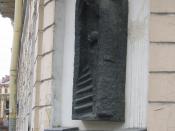In Crime and Punishment, Raskolnikov concocts a theory: All men are divided into 'ordinary' and 'extraordinary'. The extraordinary man should have the right to eliminate a few people in order to make his idea known to all humanity; however, the ordinary man has no right to transgress the law. Because he believes this theory is an idea that must be known to all humanity, he considers himself extraordinary; however, there is a legion of events that prove that Raskolnikov is not extraordinary. One can be sure that Raskolnikov believes himself to be extraordinary when Porfiry says, "...surely you couldn't have helped...fancying yourself...an 'extraordinary' man, uttering a new word in your sense.... That's so, isn't it?" to which Raskolnikov replies, "Quite possibly" (247).
Raskolnikov was strongly prompted to murder Alyona when he recalled a conversation that took place between two ordinary men in a bar. One declared: I could kill that damned old woman and make off with her money without the faintest conscious-prick....
For one life, thousands would be saved from corruption and decay.... Besides, what value has the life of that sickly, stupid, ill-natured old woman in the balance of existence? (63) Raskolnikov reasoned that it would be honorable to kill Alyona since it would supposedly benefit humanity, but the fact that "ordinary" men had the same idea should have immediately put a stop to any thoughts that he was extraordinary.
During Raskolnikov's visit to the police station to retrieve his pledges, he and Porfiry become engaged in conversation involving the theory. Porfiry voiced concerns about ordinary people mistaking themselves as extra-ordinary. Raskolnikov responded with, "...[Ordinary people] might have a thrashing sometimes for letting their fancy run away with them and to teach them their place... (244)". Raskolnikov endured a 'thrashing' of sorts (his illness), but he had been going through that since before the murders. "And his drowsiness and stupefaction were followed by an extraordinary, feverish as it were distracted haste. But the preparations to be made were few" (64).
Porfiry also voiced his concern that "ordinary" people might mistake themselves as "extraordinary" and kill innocent people when they have no inner right to do so. Raskolnikov concurs with him when he says, "The vain and foolish are particularly apt to fall into that snare; young people especially" (246). The first sentence of the novel points out Raskolnikov's age: "...early in July a young man [(Raskolnikov)] came out of the garret..." (1). Unknowingly Raskolnikov put himself into his own category of ignorant, vulnerable people.
Though according to Raskolnikov, an "extraordinary man" has the right to transgress the law, he never implies that the extraordinary man's conscience won't torment him. In fact he states, "Pain and suffering are always inevitable for a large intelligence and a deep heart." Raskolnikov has been through a great amount of pain and suffering, however contrition for his crime is never mentioned. This point of his theory does not apply to him.
Raskolnikov's theory says, "The extraordinary man has the right to commit any crime and...overstep any obstacle that stands in the way of the practical fulfillment of his idea." Raskolnikov obviously considered Alyona as an obstacle, but how was Alyona preventing the practical fulfillment of any idea? His "new word" (the part of his theory that asserted that the killing of innocent people was sometimes acceptable) did not actually require the elimination of any person to make it known. It was after all, made known to people when it was published in a magazine, therefore, he didn't have the right to kill Alyona in the first place.
Some might say that, in accordance with his theory, Raskolnikov suffered illness after his crime, thereby making him extraordinary. Though it's true that he suffered, he never said perpetration of a crime by an extraordinary man is always accompanied by illness. Also, Raskolnikov was ill before he had committed the murders. This strongly suggests that his malady was not actually related to the crime at all.
After the original introduction of his Extraordinary Man theory (241), Raskolnikov contends that the "Extraordinary Man" must be self-reliant, depend on no one, and be cut off from society. Though there are times when he wants to escape humanity, time and again it is obvious that Raskolnikov needs companionship. In several instances, Raskolnikov visited Sonia. Raskolnikov's longing for communion proves that he doesn't fulfill his own requirements of extraordinariness.
Raskolnikov likes to think that he is an "extraordinary man", but the reader sees quite another side of him. Through his contradictory ideas, life that was inconsistent with the "Extraordinary Man" theory, and social behavior, it becomes obvious that Raskolnikov is actually rather ordinary.





